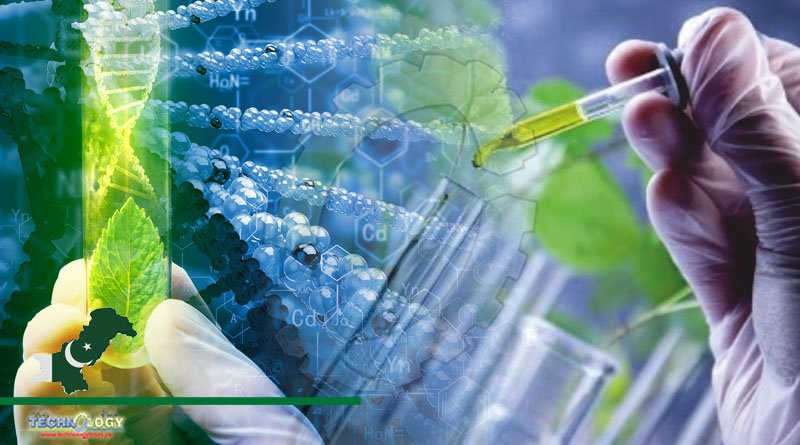Agriculture biotechnology is a section of agricultural science that focuses on modifying living things, such as plants, animals, and microorganisms, using scientific tools and methods.
 Agricultural biotechnology is a field of science that involves the application of modern genetic techniques and technologies to improve and modify plants, animals, and microorganisms used in agriculture.
Agricultural biotechnology is a field of science that involves the application of modern genetic techniques and technologies to improve and modify plants, animals, and microorganisms used in agriculture.
Traditional plant breeding has been employed for hundreds of years to create new crop varieties. However, because of the rising population, the depletion of agricultural resources like land and water, and the apparent plateauing of the yield curve of staple crops, conventional plant breeding is no longer able to meet the demand on a worldwide scale.
Moreover, because the genes of both parents are combined and rearranged more or less randomly in the offspring, undesirable genes can be passed alongside beneficial genes, or while one desirable gene is obtained, another is lost.
With traditional plant breeding, there is little to no assurance that any specific gene combination will be obtained among the millions of crosses produced. These issues restrict the advancements plant breeders can make, reducing eating time.
Agriculture biotechnology is another method that we can use for breeding. Agriculture biotechnology, or agritech, is a section of agricultural science that focuses on modifying living things, such as plants, animals, and microorganisms, using scientific tools and methods.
These include genetic engineering, molecular markers, molecular diagnostics, vaccines, and tissue culture. Desired traits are transferred from one type of crop to another. These transgenic crops have favourable traits in terms of flavour, flower colour, growth rate, harvested product size, and pest and disease resistance.
Other than those that are related to medicine, biotechnology has numerous other beneficial applications, including improved agricultural output, crops that are less susceptible to environmental stressors, improved nutrient content of food crops, enhanced meal flavour and appearance and decreased reliance on agricultural chemicals like insecticides, fertilisers, and other things.
In addition to protecting crops from disease, biotechnology has improved the effectiveness and safety of weed and insect pest management. Crops have been shielded from potentially fatal illnesses via agricultural biotechnology. Crop quality and yield may be enhanced through biotech crops, increasing the profitability of farming.
A few of these crops can aid farmers in doing their work more securely and conveniently. Farmers may now focus more on other economic activities and put less effort into crop management. Enhanced oil compositions in canola, soybean, and maize are two examples of biotech crops that may offer better quality, as is an increased beta-carotene level in rice to help reduce vitamin A shortages.
The activity of plant enzymes that turn aroma precursors into flavouring compounds has increased thanks to biotechnology, which has improved taste. There are some Important benefits of agricultural biotechnology that are discussed. Crop Improvement is one of the main benefits of agricultural biotechnology.
This involves raising production potential, nutritional content, and flavour; boosting tolerance to illnesses, pests, and environmental factors (such as salt, drought), and strengthening post-harvest characteristics, including shelf life and storage stability.
Researchers can pinpoint and choose particular genes responsible for desired features through methods like marker-assisted breeding, speeding up the conventional breeding process. Molecular diagnostics is another benefit of agritech. Agricultural biotechnology uses molecular technologies, such as DNA sequencing and polymerase chain reaction (PCR), to precisely identify and diagnose plant diseases, pests, and pathogens.
This facilitates early diagnosis and prompt application of control measures, lowering crop losses and the requirement for broad-spectrum pesticides. Agricultural biotechnology also works on enhancing livestock. As agritech has advantages for farmers, it also has certain disadvantages. The health of individuals could be impacted. It might generate new disease strains; monocultures are indicated.
The application of agricultural biotech in the production of food has advantages and disadvantages. Pesticide and herbicide use is reduced, according to proponents of GM crops, making farming more effective and productive.
Additionally, they assert that GM crops may be more resistant to climate change. GM crops are criticised for possibly posing environmental and health dangers as well as giving major businesses an excessive amount of control over our food supply.
There are alternatives to agricultural biotechnology, notwithstanding the many differing viewpoints on its advantages and disadvantages. Organic agriculture is one alternative. Neither synthetic chemicals nor genetically modified organisms are used in this kind of agriculture.
To increase agricultural productivity and quality, farmers use natural approaches. Composting, manure, and crop rotation are a few examples of how to do this.
Many people think organic farming is worthwhile because it is better for the environment, even if it can be more labour- and financially-intensive than conventional farming. Permaculture is an alternative to agricultural biotechnology.
The goal of this kind of agriculture is to develop sustainable systems. In order to make permaculture systems more effective and durable, they are created to resemble natural ecosystems. They frequently include elements like rainwater collection, greywater recycling, and food forests.
Farmers who want to become more sustainable and reduce their environmental impact should consider permaculture. Agricultural biotechnology is a contentious issue that has benefits and drawbacks on both sides. Before making any judgements, it is crucial to weigh all of the potential ramifications of this technology, the agriculture biotechnology.